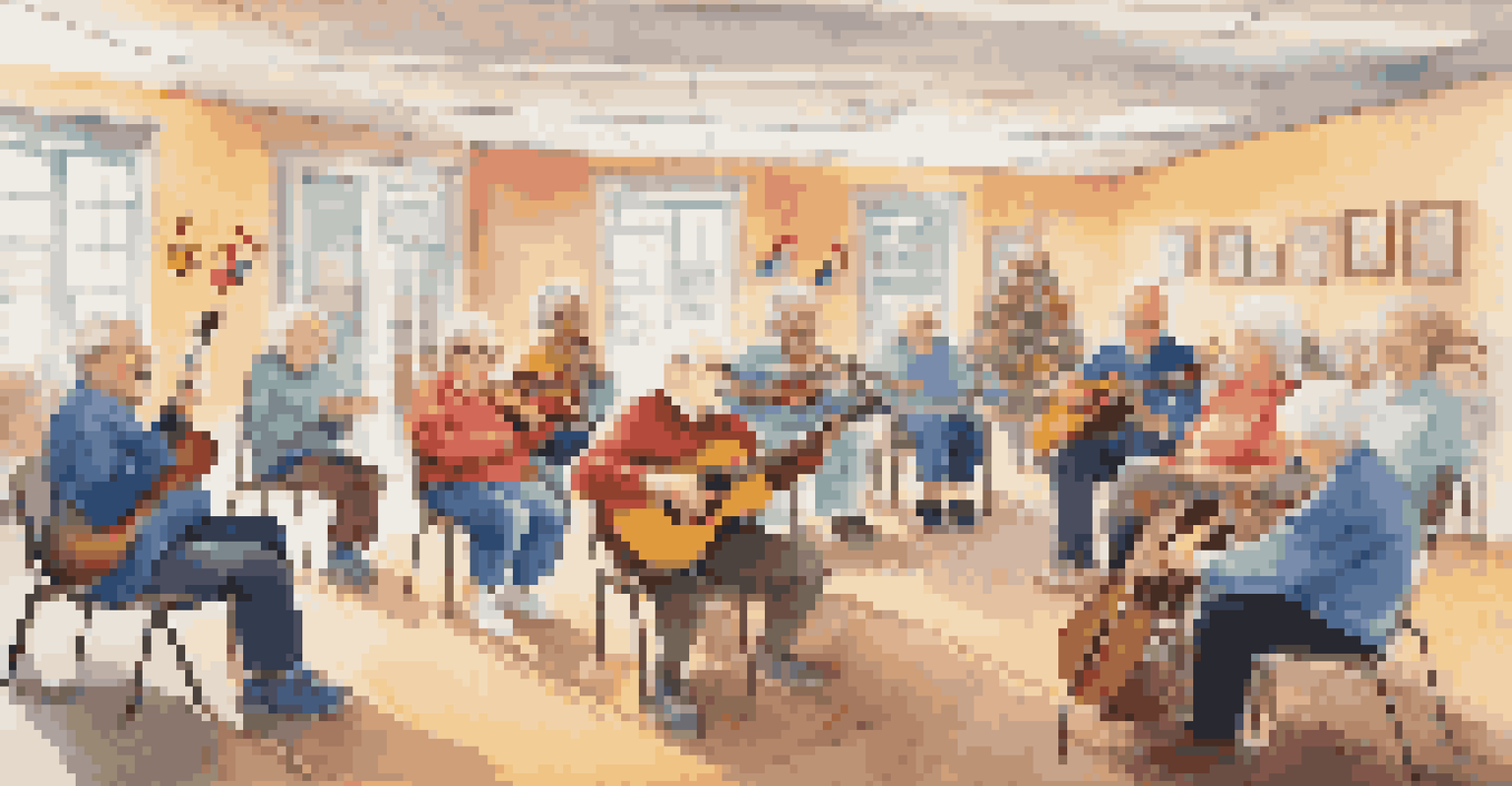The Role of Music in Enhancing Cognitive Aging

Understanding Cognitive Aging and Its Challenges
Cognitive aging refers to the natural decline in mental abilities as we age. This process can affect memory, attention, and problem-solving skills, making everyday tasks challenging. It's important to understand that while some decline is normal, certain strategies can help mitigate these effects.
Music can change the world because it can change people.
As we grow older, many individuals experience changes in cognitive function that can be frustrating. For instance, forgetting names or struggling to recall information can be common. This gradual change is often accompanied by a sense of loss, but there are ways to maintain mental sharpness.
Engaging in activities that stimulate the brain, such as puzzles or reading, is crucial for cognitive health. However, researchers have found that music can play an especially powerful role in enhancing cognitive function during aging. This leads us to explore how music impacts our brains.
The Science Behind Music and the Brain
Music activates various parts of the brain, including those associated with memory, emotion, and motor skills. When we listen to music, our brains release dopamine, a chemical that promotes feelings of pleasure and reward. This release can motivate us and improve our mood, which is vital for cognitive health.

Interestingly, studies have shown that musicians often have enhanced cognitive abilities compared to non-musicians. This could be due to the complex mental processes involved in playing an instrument, which requires coordination and concentration. Thus, engaging with music can provide a cognitive workout.
Cognitive Aging: Understanding the Shift
Cognitive aging involves a natural decline in mental abilities, but strategies like engaging with music can help mitigate these effects.
Moreover, listening to familiar tunes can evoke memories and emotions, serving as a mental anchor. This connection between music and memory can be particularly beneficial for individuals experiencing cognitive decline, as it can help them access memories that might otherwise seem lost.
Music Therapy: A Tool for Cognitive Enhancement
Music therapy has emerged as a powerful tool in enhancing cognitive function among older adults. Certified music therapists use structured music activities to improve cognitive, emotional, and social well-being. This therapeutic approach can significantly impact those dealing with dementia or Alzheimer's disease.
The power of music is such that it can evoke memories and emotions, serving as a mental anchor.
One notable study found that participants engaged in music therapy showed improved memory recall and reduced anxiety levels. By incorporating familiar songs or encouraging them to play instruments, therapists can create a supportive environment for cognitive growth. This underscores the potential of music therapy as an effective intervention.
Additionally, music therapy promotes social interaction, which is crucial for cognitive health. Group sessions encourage communication and collaboration, helping to combat feelings of isolation that can accompany aging. This social element enhances the overall benefits of music in cognitive aging.
Active vs. Passive Music Engagement
When discussing music's role in cognitive aging, it's essential to differentiate between active and passive engagement. Active engagement involves playing an instrument or singing, while passive engagement includes listening to music. Both forms can offer benefits, but they serve different purposes.
Active engagement tends to provide more significant cognitive benefits. For example, learning to play an instrument requires focus, memory, and motor skills, all of which can enhance brain function. This kind of involvement can keep the mind sharp and create a sense of accomplishment.
Music Therapy Enhances Cognitive Function
Structured music therapy has proven effective in improving cognitive and emotional well-being for older adults, particularly those with dementia.
On the other hand, passive engagement, such as listening to music, can also be beneficial. It can evoke emotions and memories, offering comfort and relaxation. Incorporating both types of engagement into daily life can lead to a well-rounded approach to maintaining cognitive health.
Creating a Music-Rich Environment
To harness the benefits of music, it's important to create a music-rich environment. This can be as simple as playing tunes during daily activities or designating specific times for musical enjoyment. Surrounding ourselves with music can encourage regular engagement and foster a love for sound.
Consider curating playlists that resonate with your personal experiences or preferences. Familiar songs can evoke nostalgia and stimulate memories, promoting cognitive engagement. Engaging with music in this way can become a joyful routine that enhances mental well-being.
Additionally, joining community music groups or classes can provide opportunities for social interaction and learning. These activities not only stimulate the brain but also create a sense of belonging, which is vital for emotional health as we age.
The Role of Genre in Cognitive Benefits
Not all music is created equal when it comes to cognitive benefits. Different genres can evoke various emotional responses and cognitive reactions. For instance, classical music is often associated with relaxation and focus, while upbeat genres like pop can energize and motivate.
Research suggests that classical music, particularly compositions with a certain tempo and structure, can enhance cognitive performance. This phenomenon is sometimes referred to as the 'Mozart Effect,' highlighting how specific musical elements can positively influence brain function.
Active Engagement Boosts Brain Health
Engaging actively with music, such as playing an instrument, provides greater cognitive benefits compared to passive listening.
However, personal preference plays a significant role in how music affects cognition. What works for one person may not work for another, so it's essential to explore different genres to find what resonates best. This personal connection to music can maximize its cognitive benefits.
Looking Ahead: Music and Future Research
As we continue to explore the relationship between music and cognitive aging, future research will likely uncover more about its benefits. Scientists are investigating how different types of music can be strategically used to enhance cognitive function in aging populations. This ongoing research could lead to new therapeutic practices.
Additionally, with advancements in technology, we may see innovative ways to incorporate music into cognitive health programs. For instance, virtual reality experiences combined with music could create immersive environments that stimulate cognitive engagement and emotional connection.

Ultimately, the role of music in cognitive aging is an exciting area of study that holds great promise. As we learn more, we can better understand how to leverage music to improve cognitive health and enhance the quality of life for older adults.